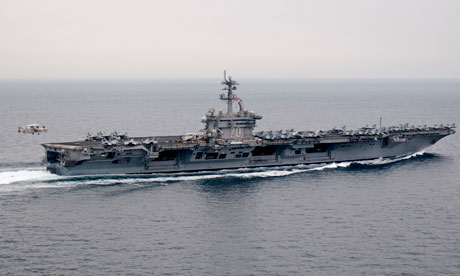
Osama bin Laden's burial at sea was quickly criticised by Muslim scholars who claimed it had breached sharia law and warned that it may provoke calls for revenge attacks against US targets.
Others used the sea burial question to question whether he was dead at all, with doubts fuelled by the absence of authentic photographs of his corpse.
US officials said tests using DNA from several of Bin Laden's family members had provided "virtual certainty" that it was his body. A woman believed to be one of Bin Laden's wives identified the al-Qaida leader, and he was visually identified by members of the US raiding party, the Pentagon said. Burying him on land could have led to his grave becoming a focus of contention and pilgrimage as well as posing tough questions about where he should be laid to rest.
"Finding a country willing to accept the remains of the world's most wanted terrorist would have been difficult," a US official said. "So the US decided to bury him at sea." The burial reportedly took place from the deck of the aircraft carrier USS Carl Vinson in the North Arabian sea.
Senior US officials told news agencies that his body was disposed of in accordance with Islamic tradition, which involves ritual washing, shrouding and burial within 24 hours.
The 24-hour rule has not always been applied in the past. For example, the bodies of Uday and Qusay Hussein – sons of the Iraqi dictator Saddam – were embalmed and held for 11 days after they were killed by US forces. Their bodies were later shown to media, provoking some angry responses.
It remains unclear if the US will release photos of Bin Laden's remains, but dispelling any doubts that he is dead is likely to be a major impetus – particularly in an age when conspiracy theories can be powerfully manipulated on the web.
In a hint that such a release may be on the cards, John Brennan, Barack Obama's counter-terrorism adviser said: "We are going to do everything we can to make sure that nobody has any basis to try to deny that we got Osama bin Laden." He added that the US will "share what we can because we want to make sure that not only the American people but the world understand exactly what happened."
Brad Sagarin, a psychologist at Northern Illinois University who studies persuasion, said the rapid disposal of the body "would certainly be a rich sort of kernel for somebody to grasp on to if they were motivated to disbelieve this."
Citing the example of those who refuse to believe that Barack Obama is a US citizen, he added: "As with the birther conspiracy, there's going to be a set of people who are never going to be convinced. People filter the information they receive through their current attitudes, their current perspectives."
Already, doubt is spreading in Pakistan. Many people do not want to believe that Bin Laden is really dead, even though an al-Qaida spokesman, in vowing vengeance against America, called him a martyr, offering no challenge to the US account of his death.
In the immediate aftermath, people in Abbottabad expressed widespread disbelief that Bin Laden had died or ever lived among them.
"I'm not ready to buy Bin Laden was here," said Haris Rasheed, 22, who works in a fast food restaurant. "How come no one knew he was here and why did they bury him so quickly? This is all fake, a drama, and a crude one."
Kamal Khan, 25, who is unemployed, said the official story "looks fishy".
In terms of the basic requirements for Muslim burials, standard practice involves placing the body in a grave with the head pointed toward the holy city of Mecca. Burial at sea is rare in Islam, though Muslim websites say it is permitted in certain circumstances. One is during a long voyage where the body may decompose and pose a health hazard to a ship's passengers, an exception noted on Monday by Tunisian scholar Ahmed al-Gharbi. Another is if there is a risk of enemies digging up a and grave and exhuming or mutilating the body.
Dr Saud al-Fanisan, former dean of the faculty of sharia law in Riyadh, Saudi Arabia, said that if a body was buried at sea it should be protected from fish. In the words of alislam.org, the body should be lowered into the water "in a vessel of clay or with a weight tied to its feet".
Mohammed al-Qubaisi, Dubai's grand mufti, said of Bin Laden's burial: "They can say they buried him at sea, but they cannot say they did it according to Islam. Sea burials are permissible for Muslims in extraordinary circumstances. This is not one of them."
Abdul-Sattar al-Janabi, who preaches at Baghdad's Abu Hanifa mosque, said: "What was done by the Americans is forbidden by Islam and might provoke some Muslims.
"It is not acceptable and it is almost a crime to throw the body of a Muslim man into the sea. The body of Bin Laden should have been handed over to his family to look for a country to bury him."
The radical Lebanon-based cleric Omar Bakri Mohammed said: "The Americans want to humiliate Muslims through this burial, and I don't think this is in the interest of the US administration."
The Egyptian analyst and lawyer Montasser el-Zayat said Bin Laden's sea burial was designed to prevent his grave from becoming a shrine. But an option was an unmarked grave. "They don't want to see him become a symbol," he said. "But he is already a symbol in people's hearts."


















0 comments:
Post a Comment